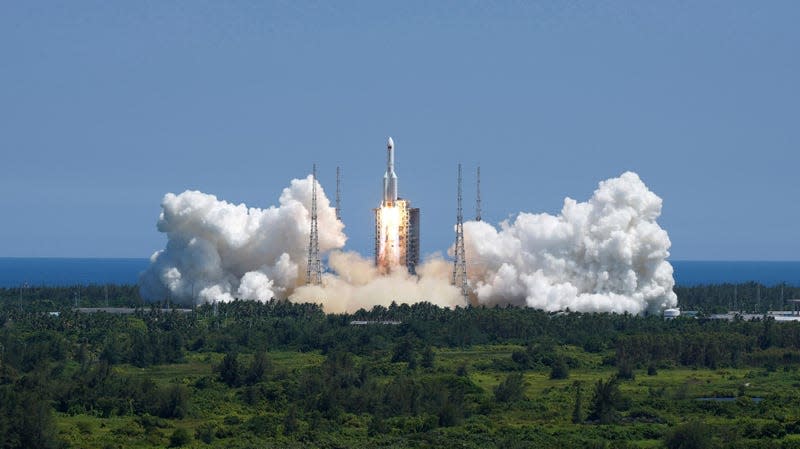Looks Like We're Going to Have to Get Used to China's Crashing Rockets

China’s Long March 5B launching from the Wenchang Spacecraft Launch Site in South China.
Less than a week after China’s Long March 5B rocket performed an uncontrolled reentry through Earth’s atmosphere, a Chinese official revealed plans to amp up the launch rate of these rocket within the next few years.
During an interview with local media, the director of the general design department at the China Academy of Launch Vehicle Technology, Liu Bing, said the Long March 5B rocket will now be used to launch a “multi-satellite network.” Liu was likely referring to the country’s plan of building an internet satellite megaconstellation called Guo Wang, which will include more than 12,000 satellites in orbit.
Read more
“In the next few years, the Long March 5 series of rockets will be transferred to the high-density launch stage to meet the country’s needs for large-scale and rapid access to space,” Liu is quoted as saying.
China has been using its Long March 5B rockets to launch modules of its Tiangong space station. Most recently, the heavy-lift rocket carried the third and final piece of the space lab, launching a 23-ton lab module named Mengtian to orbit.
Launches of the Long March 5B have been deemed problematic as the rocket’s booster comes tumbling down to Earth afterwards, and with no sure way to predict where it’s going to fall. On November 4, a Long March 5B booster reentered Earth’s atmosphere, crashing over the south-central Pacific Ocean, with debris falling to the southwest of the Mexican coast. During its unpredictable descent, Spain had to shut down its airspace over risk posed by the plummeting debris. Thankfully, there were no reports of injuries, but the rocket’s uncontrolled reentry has cut it very close before.
This was the fourth incident involving the Long March 5B core stage falling in an unpredictable trajectory. Two years ago, debris from the inaugural launch of the rocket fell onto the Ivory Coast, causing damage to people’s property. For the rocket’s second flight, the booster fell into the Indian Ocean away from populated areas. But on its third flight in July 2022, it reentered Earth’s atmosphere as was visible from Malaysia as pieces of space junk crashed down onto parts of Indonesia and Philippines.
“It is clear that China is failing to meet responsible standards regarding their space debris,” NASA administrator Bill Nelson said in a statement released last year. “It is critical that China and all spacefaring nations and commercial entities act responsibly and transparently in space to ensure the safety, stability, security, and long-term sustainability of outer space activities.”
On the other hand, China seemingly doesn’t care about its falling rockets. Long March 5B boosters aren’t designed to perform late reentry burns, which require some additional fuel. These burns allow the rocket to set a course for unpopulated areas, typically the ocean. Controlled reentries also require additional components, which would serve to decrease the rocket’s overall payload capacity.
It’s not clear if China will modify its rockets such that they’re capable of performing controlled reentries. Given that Chinese officials have said little to nothing about the falling rockets in the past, and that the rocket is now in regular circulation, it seems unlikely that they intend to modify the Long March 5B.
The risk of falling rocket debris causing an injury or property damage are slim but nonzero. China’s Long March 5B rocket has cut it close by spreading debris near populated areas on two of four launches. Additionally, the closing down of Spain’s airspace resulted in delayed flights. So, even though no one has gotten hurt yet, but these wayward boosters are causing worry and inconvenience. China needs to take accountability for its falling rockets and adhere to agreed upon international standards for ensuring public safety.
More: NASA’s Moon Rocket Endures Excessive Winds on Its Launchpad in Florida
More from Gizmodo
The Best Shortcuts On Mac: Snap Windows, Text to Speech, and More
How to Delete Your Twitter Account If Elon Musk Was Your Last Straw
Sign up for Gizmodo's Newsletter. For the latest news, Facebook, Twitter and Instagram.

